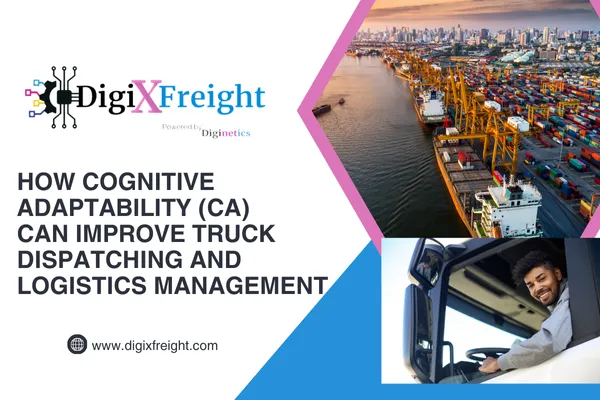Blog

How Cognitive Adaptability (CA) Can Improve Truck Dispatching and Logistics Management
In logistics, efficiency is everything. Dispatchers and logistics managers must juggle schedules, coordinate with drivers, resolve unexpected delays, and keep customers satisfied—all while working in a high-pressure environment. But beyond the technical skills of routing and scheduling, one of the most important yet overlooked skills in logistics is Cognitive Adaptability (CA).
Cognitive Adaptability refers to the ability to process information, adjust responses, and communicate effectively in any situation. Those with high CA are often great problem solvers, strong communicators, and excellent team players. Whether you’re managing drivers, working with brokers, or dealing with customers, CA helps you stay in control of the situation rather than letting the situation control you.
In this post, we’ll break down why CA is critical in logistics and truck dispatching and how you can develop it to become a stronger leader in this fast-paced industry.
What is Cognitive Adaptability in Truck Dispatching?
In logistics, we often focus on hard skills—understanding freight rates, load planning, fuel costs, and compliance. However, logistics is also a people-driven industry. Drivers, customers, warehouse staff, and dispatchers all need to work together to keep freight moving efficiently.
Cognitive Adaptability (CA) is about your ability to read situations, adjust your mindset, and communicate in a way that drives solutions. For a dispatcher or logistics manager, this can mean:
Keeping a clear head when unexpected issues arise (e.g., delays, breakdowns, or customer complaints).
Communicating with drivers in a way that builds trust and reduces frustration.
Understanding a driver’s perspective when they’re dealing with tight schedules, traffic, or long hours.
Resolving conflicts between team members professionally and efficiently.
Maintaining strong relationships with customers and partners.
By developing CA, you don’t just improve how you interact with others—you also create a more organized, stress-free dispatching environment.
IQ vs. CA in Logistics: Which Matters More?
IQ (Intelligence Quotient) refers to cognitive intelligence—problem-solving, critical thinking, and technical expertise. CA, on the other hand, refers to your ability to adjust, communicate, and control responses based on different situations.
Before Developing CA:
🚛 A dispatcher gets frustrated when a driver is late, immediately calls to reprimand them, and damages the relationship.
🚛 A logistics manager ignores driver complaints about long wait times at warehouses, leading to high turnover.
🚛 A broker fails to reassure a nervous shipper when a delay occurs, causing the customer to take their business elsewhere.
After Developing CA:
✅ The dispatcher asks the driver what happened, listens, and helps them find a solution instead of assigning blame.
✅ The logistics manager proactively works with warehouses to reduce driver wait times, improving retention.
✅ The broker communicates clearly and reassures the customer, maintaining trust and securing future business.
In logistics, IQ helps you optimize routes, but CA helps you optimize relationships and responses.
The 5 Key Cognitive Adaptability Skills for Dispatchers and Logistics Managers
Based on Neuro-Linguistic Programming (NLP) principles, five key skills determine success in leadership roles—including dispatching and logistics management.
Self-Awareness & Situational Framing
Being able to recognize your own thought patterns and how they impact your decisions is critical in logistics.
Why it matters: If you’re stressed, you might take it out on drivers or coworkers, creating tension and reducing efficiency.
Example: A dispatcher recognizes they’re feeling overwhelmed and takes a moment to reset before speaking to a driver about a late load.
How to improve: Use pattern recognition techniques to identify stress triggers and adjust responses accordingly.
Emotional Regulation & Reframing
The ability to control emotional responses and shift perspectives under pressure.
Why it matters: Delays, breakdowns, and customer complaints are part of logistics. Losing your temper doesn’t solve anything.
Example: Instead of yelling at a driver stuck in traffic, a dispatcher reframes the situation as an opportunity to adjust schedules efficiently.
How to improve: Before reacting, pause, shift perspectives, and ask: “How else can I interpret this situation?”
Outcome-Oriented Mindset
Focusing on desired outcomes rather than emotional reactions leads to better logistics management.
Why it matters: A solution-driven dispatcher finds options rather than getting stuck in frustration.
Example: A logistics manager encourages drivers by recognizing their hard work, leading to better performance and lower turnover.
How to improve: Use future pacing techniques—mentally rehearsing successful outcomes before responding.
Empathetic Communication
Understanding what others are experiencing—whether it’s a frustrated driver, a stressed-out customer, or an overwhelmed team member.
Why it matters: Logistics involves high-stress situations. Being empathetic helps build loyalty and teamwork.
Example: A dispatcher notices a driver is struggling and checks in instead of just assigning another load.
How to improve: Practice mirroring and active listening to build trust in conversations.
Influence & Persuasion
Strong communication, conflict resolution, and negotiation abilities.
Why it matters: Good relationships lead to smoother operations, better problem-solving, and improved customer satisfaction.
Example: A dispatcher with strong persuasive skills can negotiate with a warehouse manager to reduce driver wait times.
How to improve: Use linguistic framing techniques—adjusting how you phrase requests for a better response.
How CA Transforms a Logistics Operation
Companies with cognitively adaptable leaders and dispatchers tend to run more efficient and profitable operations. Studies show that strong CA leads to:
📈 Better driver retention – Drivers are less likely to quit when they feel valued.
📈 Faster problem resolution – Dispatchers who stay calm and think clearly solve issues quickly.
📈 Stronger customer relationships – A shipper will keep working with a logistics company that communicates well.
📈 Higher team morale – Employees feel motivated and engaged when treated with respect.
In short: CA doesn’t just make you a better leader—it makes your logistics operation more successful.
Final Thoughts: Master CA, Master Dispatching
Truck dispatching and logistics management aren’t just about moving freight from point A to point B—they’re about working with people to make things happen. By improving your Cognitive Adaptability, you can create a more efficient, stress-free, and profitable logistics operation.
Want to take your logistics career to the next level? Start developing your CA today! Shoot me an email at [email protected]
What do you think? Have you seen the impact of Cognitive Adaptability in logistics? Share your experiences in the comments below!






